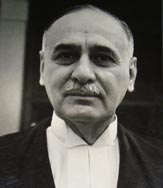
Meet Justice Vivian Bose and his Notable Judicial decisions
Justice Vivian Bose (1891–1983) was one of the original judges of the Supreme Court of India, serving from March 5, 1951, to June 9, 1956, and returning for a second tenure under Article 128 until September 1958. He was the first Christian and only Eurasian judge in the Supreme Court’s history, and prior to his elevation, served as Chief Justice of the Nagpur High Court. Justice Bose was renowned for his judicial activism, progressive outlook, and for breaking new ground in Indian law, often through landmark dissents and forward-thinking opinions.
Judicial Career and Philosophy
Justice Bose’s jurisprudence was marked by a deep commitment to individual rights, procedural fairness, and the living spirit of the Constitution. He was known for his clarity, independence, and for quietly advancing legal reforms without overt activism. His judgments often anticipated later developments in Indian law, and he was respected for his scholarship, integrity, and compassion.
Landmark Judgments
1. Virsa Singh v. State of Punjab (1958 AIR 465)
This is perhaps Justice Bose’s most celebrated Supreme Court judgment. He clarified the interpretation of Section 300 “Thirdly” of the Indian Penal Code, which defines murder. Justice Bose held that to convict a person for murder under this section, it must be shown that the injury inflicted was both intentional and sufficient in the ordinary course of nature to cause death. This precedent remains a cornerstone in Indian criminal law, providing clear guidelines on intent and causation in murder cases.
2. Secretary of State v. Sheoramjee (AIR 1952 Nag 213)
As a High Court judge, Bose held that a forest officer, engaged in commercial activities, could not claim sovereign immunity for tortious acts. This early judgment limited the scope of sovereign immunity and paved the way for greater state accountability in tort law.
3. Pannalal v. Bhaiyalal (AIR 1937 Nag 281)
Justice Bose recognized that uninterrupted settled possession, even for less than 12 years, could be a valid defense to protect possession except against the true owner. This advanced the doctrine of possessory rights in property law.
4. Dalchand Mulchand v. Hasanbi (AIR 1938 Nag 152)
He held that if the signature on a document is admitted or proved, the burden shifts to the signatory to explain why they should not be bound by it, reinforcing principles of contract law and evidentiary burden.
5. Commissions of Inquiry
After his Supreme Court tenure, Justice Bose chaired the inquiry into the Mundhra scandal, exposing government-industrialist collusion, and the Dalmia-Jain Commission, investigating financial improprieties. His fearless reports established standards for public accountability and transparency in governance.
Legacy
Justice Vivian Bose is remembered as a judicial pioneer whose judgments and inquiries set enduring standards in criminal, property, and administrative law. His insistence on fairness, accountability, and the living nature of the Constitution continues to influence Indian jurisprudence. Beyond the bench, he contributed to legal education, Scouting, and international legal organizations, embodying a lifelong commitment to public service and justice.












comments